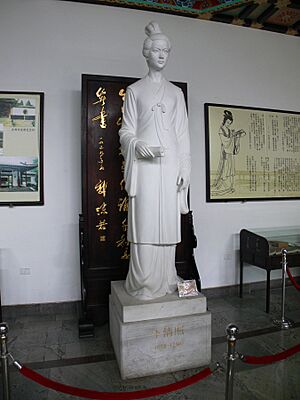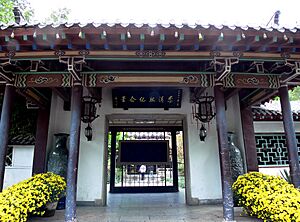Li Qingzhao facts for kids
Quick facts for kids
Li Qingzhao
|
|||||||||
|---|---|---|---|---|---|---|---|---|---|
| 李清照 | |||||||||

Statue of Li Qingzhao in the Li Qingzhao Memorial, Zhangqiu District, Jinan
|
|||||||||
| Born | 1084 |
||||||||
| Died | 1155 (aged 70–71) |
||||||||
| Occupation | Poet, essayist | ||||||||
|
Notable work
|
Afterword to Catalogue of Inscriptions on Metal and Stone Ci of Shuyü |
||||||||
| Spouse(s) |
|
||||||||
| Parent(s) | Li Gefei (father) | ||||||||
| Chinese name | |||||||||
| Chinese | 李清照 | ||||||||
|
|||||||||
| Yi'an Jushi | |||||||||
| Chinese | 易安居士 | ||||||||
|
|||||||||
Li Qingzhao (born in 1084, died around 1155) was a famous Chinese poet and essay writer. She lived during the Song dynasty and is known as one of the greatest poets in China's history. Her special pen name was Yi'an Jushi.
Contents
Li Qingzhao's Life Story
Her Early Years
Li Qingzhao was born in 1084 in Jinan, a city in Shandong province. She came from a family of educated people and government officials. Her father, Li Gefei, was a well-known writer and professor. Her mother was also a talented poet.
Her family had a huge collection of books. This meant Li Qingzhao received an excellent education when she was young. Her early poems show how innocent and smart she was. They also show her deep love for nature. She started writing poems as a teenager, showing her amazing talent early on.
Her Marriage and Challenges
By 1101, when Li Qingzhao was eighteen, her poetry was already famous among important people. She married Zhao Mingcheng, who shared her love for poetry, books, art, and ancient objects.
After her husband started his government job, he was often away. They weren't rich, but they loved collecting old writings and artworks. Li Qingzhao was very happy with her husband, and her poems from this time became calm and beautiful. They often wrote poems for each other.
Sadly, their happy life changed when wars broke out between the Song dynasty and the Jurchens. In 1127, the capital city, Kaifeng, was captured. Their home was burned, and they had to leave everything behind. Li and Zhao, like many others, suffered greatly and fled south across the Yangtze River.
They settled in Nanjing for a year. But in 1129, Zhao died from an illness while traveling for a new job. Li Qingzhao was heartbroken and never truly recovered. She had to protect their remaining collection of precious items by herself. She wrote about her married life and the difficulties of fleeing in a special afterword to her husband's book, Catalogue of Inscriptions on Metal and Stone.
Her Later Life
After the wars, Li Qingzhao settled in Hangzhou, which became the new capital of the Song government. She continued writing poetry, but her later works were full of sadness. They often remembered her husband and her old hometown. She also worked hard to finish her husband's book.
For a short time, she married another man named Zhang Ruzhou, but it didn't work out, and they divorced quickly. She faced some criticism for this marriage. It is believed she died around the age of 71, but there are no exact records of her death.
Sadly, many of her poems were lost during these difficult times. Only about a hundred of her poems are still known today. Most of them are in the ci style, and they show the many ups and downs of her life.
Li Qingzhao's Poems
Li Qingzhao's life was full of changes, and her poems reflect this. Her early poems were often about her feelings as a young woman, sometimes like love poems. After she moved south because of the wars, her poems became about her sadness over the war and her love for her country. She was known for her "subtle and concise style" of writing.
One of her famous ci poems is "A Dream Song." She wrote it when she was young, living in Jinan, remembering her hometown before she was married. Here are two parts of "A Dream Song":
| Chinese | English |
|---|---|
| 《如梦令·常记溪亭日暮》
常记溪亭日暮, 沉醉不知归路。 兴尽晚回舟, 误入藕花深处。 争渡,争渡,惊起一滩鸥鹭。 |
It was a day at Brookside pavilion
That I often fondly remember, When, flushed with wine We could hardly tear ourselves away From the beautiful view of sunset. Returning late by boat When we'd enjoyed our fill, We got lost and strayed To where the clustered lotuses Were at their thickest. Pushing and thrashing, Pushing and thrashing as best we could, We scared into flight A shoreful of dozing egrets and gulls. |
| Chinese | English |
|---|---|
| 《如梦令·昨夜雨疏风骤》
昨夜雨疏风骤,浓睡不消残酒。 试问卷帘人,却道海棠依旧。 知否,知否?应是绿肥红瘦。 |
Late night wind howled with light shower,
Still hungover despite my heavy slumber. Ask for shades to be rolled from sill, Was told my HaiTang blossomed still. Oh honey! But don't you know? Tis the season reds ebb and greens flow. |
Places Honoring Li Qingzhao
Many places in China remember Li Qingzhao and her amazing contributions to poetry. There are several memorial halls dedicated to her. These places help people learn about her life and enjoy her beautiful poems.
For example, the "Qingzhao Garden" in Zhangqiu, Shandong, is a large memorial that opened in 1997. There's also a memorial hall in Qingzhou, Shandong, and another in Baotu Spring Park in Jinan, where people once thought she lived. In Jinhua, Zhejiang, a memorial hall was set up in 1994. In Hangzhou, Zhejiang, where she lived later in life, the Qingzhao Pavilion was opened in 2002. These places keep her memory alive for future generations.
 | Charles R. Drew |
 | Benjamin Banneker |
 | Jane C. Wright |
 | Roger Arliner Young |



